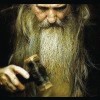 There is no “feast” that seems more “American” than Thanksgiving. Many of us Orthodox also recognize this holiday in some sort of way. Usually we say that it is a day in which “they” remember that the Pilgrims landed in this country. Of course, the “they” that we use in such a sentence refers to any of the non-Orthodox Americans that we live with.
There is no “feast” that seems more “American” than Thanksgiving. Many of us Orthodox also recognize this holiday in some sort of way. Usually we say that it is a day in which “they” remember that the Pilgrims landed in this country. Of course, the “they” that we use in such a sentence refers to any of the non-Orthodox Americans that we live with.
And yet, this is real chance for us – it may be one of the few “American” things that we can truly make Orthodox. We will never be able to totally interpret the secular things of America in an Orthodox way – such as hot dogs and beer, or Rock and Roll Masses. But here on Thanksgiving Day is exactly where it should be done. This is so because if you think about and are especially aware of the words and feeling of our Divine Liturgy, there is nothing more Orthodox than giving thanks or “thanksgiving.”
It is, therefore, on Thanksgiving Day that we have a chance to help America look deeper into itself – by looking at this “typical” American holiday of Thanksgiving from an Orthodox point of view. We know that to be Orthodox, if we really know about Orthodoxy, implies that “deeper look.” But what is meant by looking deeper?
To begin with, if we as Americans, both Orthodox and non-Orthodox, fail to see the greater lesson of what “Thanksgiving” means, if it is just the remembering of an historical event, it will remain only a memory and not something that we call a Holiday, or better yet, a Holy Day. This is so because just the memory is not enough. Memory may be helpful, but it does not guarantee holiness. Why do we say Holy Day? When we answer this question, we will have taken that “deeper look.”
Surely those that landed in America understood why the day was “holy.” They were not only celebrating their historic landing as holy, as we do today in this shallow way; they looked deeper and when they did, they gave thanks together in a real communion with each other and with God for all the bountiful gifts with which they were blessed. Perhaps they understood, even better than we do, what it means when we sing in our Liturgy: “for the abundance of the fruits of the earth and for peaceful times….” That’s it! That’s the deeper look; men standing together before God in thankfulness. Men bound by common problems. Men bound by common goals.
Orthodoxy, therefore, has the great opportunity to be able to dissect the word “Thanksgiving,” to show this fullness. In fact, we are constantly showing what it really means at every Liturgy, for it is here that thanksgiving is not only a memory, not only a day; it is a “state” or a “position” that we are in. What is that “state” which is holy? It is a standing together – no, it begins earlier – it begins with the procession of each of us from the bed of our homes to the place where we will stand, to be together, even as those pilgrims were, to give thanks. The height of this thanksgiving is when we offer up the gifts of bread and wine – “Thine own of Thine own, we offer unto thee, in behalf of all and for all” – while we are offered life in return from God.
Can we take America back to that original meaning, to that deeper look? The pilgrims had it, but we have preserved it! Perhaps now we can say “we” instead of “they” to show that Thanksgiving is not only for non-Orthodox. Certainly, it is at the Divine Liturgy where “we” should begin this Day of Thanksgiving. Is there less that we can do?
What’s so Orthodox about Thanksgiving? Orthodoxy?














